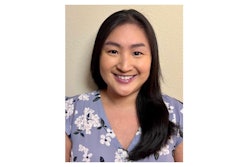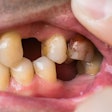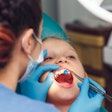Recently, I spent time with a new baby in my extended family. I stared down lovingly at him and was so fixated on just watching him be a baby. Dentistry is never far from my mind, so I quickly saw the parallels between this cute-as-can-be baby and my geriatric patients.
 Dr. Alexis Lee.
Dr. Alexis Lee.
From edentulism to excessive drooling, minimal motor function and the inability to speak, this is all very familiar in my day-to-day life doing dentistry in nursing homes.
This made me wonder why, as people living in the U.S., we have a generally positive attitude toward babies and children but an often negative attitude toward older adults.
I can only surmise that part of it is due to the innate feeling to protect our young. We have natural feelings of love toward them and are programmed to smile at those cute humans with big eyes and tiny bodies.
But what happens to seniors? I believe older adults, especially those who have limited mental and physical capabilities, are often dismissed, ignored, and found to be unimportant.
I would like to do my best to change the culture surrounding the treatment of geriatric patients. In the past, I was often told that I would make a great pediatric dentist. I can only guess that this is due to my small stature and upbeat personality.
I always took it as a compliment, as pediatric dentists are praised for being kind, warm, and patient. However, I believe these qualities are also well suited to caring for geriatric patients. Every day I attempt to use all my best qualities to simply be kind. It is not always easy.
To me, the main difference, besides physical differences, between pediatric and geriatric patients is that older adults can have very strong opinions and will voice them accordingly. I admit that in the beginning of my journey in nursing homes, I was a bit fearful when someone would yell and grab at me, but now I take it in stride because if I don’t, I wouldn’t be doing my job. Even patients in a standard private practice usually aren’t happy to see the dentist, so I remind myself of that. Unfortunately, I know I am not typically a welcome sight.
Just like how one would work with babies and children, I start my visit by introducing myself and seeing how the patient reacts. It’s a walk in the park if they smile and are ready to have a conversation about their oral health. But that doesn’t happen very often.
Sometimes the patients will immediately become agitated or the opposite (they don’t respond at all). If they are agitated, I continue talking to see if they will calm down when they understand I am only there to help them if they want it.
If they don’t respond, I may do a gentle tap on their shoulder. Some patients have limited abilities, so if they don’t respond vocally, a physical touch allows me to see if they are understanding why I am there. They may nod, smile, blink, or, better yet, open their mouth when I approach them. I use those cues to lead me in my next steps.
As you can see, a lot of these methods are similar to how dentists work with children. There would be a lot of talking while monitoring the patient’s reactions and attitude throughout the visit to adjust accordingly.
My assistants and I also use some pediatric euphemisms such as vitamins for fluoride, counting the teeth for an exam, and taking pictures for radiographs. They are not being talked down to; instead, these terms help them understand the reason for our visit.
It is also good to remember that many times, patients are more cognizant than they let on, so I usually start by using standard dental terms and then switch to language that is easier to understand if they don’t seem receptive.
At the end of the day, it helps me to remember that, yes, each person is in a very different part of life with individual personalities and needs, but we are all just people. Old or young, it always helps to have compassion.
You never know exactly what a person is going through currently or what they have experienced in their past. We all only truly experience life through our own eyes.
In the dental office, we always tolerate and make exceptions for children’s bad behavior and other limitations, so why can’t we give the same grace to our elderly patients? I find that we can always still learn new things from patients in nursing homes. We just need to be able to hear their stories.
Dr. Alexis Lee is a San Francisco Bay Area native and is a graduate of the University of the Pacific Arthur A. Dugoni School of Dentistry. She also received her Bachelor of Arts degree in rhetoric from the University of California, Berkeley. Since becoming a dentist, Lee has never forgotten her love of reading and writing and is excited to incorporate dentistry into her journey of becoming an established author.
The comments and observations expressed herein do not necessarily reflect the opinions of DrBicuspid.com, nor should they be construed as an endorsement or admonishment of any particular idea, vendor, or organization.



















